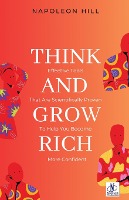"Think and Grow Rich" is a seminal self-help book written by Napoleon Hill, first published in 1937. Drawing on Hill's interviews with successful individuals like Andrew Carnegie, Thomas Edison, and Henry Ford, the book explores the principles of personal achievement and financial success.Hill outlines a philosophy of success based on the power of thought and the importance of setting clear goals. He emphasizes the role of desire, faith, and persistence in overcoming obstacles and realizing one's dreams. The book delves into the concept of the "mastermind," highlighting the value of surrounding oneself with like-minded individuals who can offer support and guidance.Through practical advice, inspirational anecdotes, and actionable strategies, "Think and Grow Rich" has empowered countless readers to unlock their full potential and achieve their aspirations. It remains a timeless classic in the field of personal development, offering valuable insights into the mindset and habits of successful individuals.

